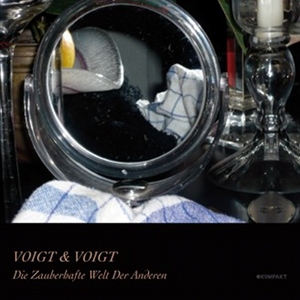Voigt & Voigt Die Zauberhafte Welt der Anderen
It’s hard to tell if Kompakt co-owner Wolfgang Voigt is the Cologne label’s bellwether or […]

It’s hard to tell if Kompakt co-owner Wolfgang Voigt is the Cologne label’s bellwether or its impish black sheep. Whatever the case, after resurrecting the Mohn moniker with Jörg Burger for a self-titled LP last year, Voigt has again teamed up with his brother Reinhard for Die Zauberhafte Welt der Anderen, an album that similarly lands far from the the crossover techno his label made its name with throughout last decade. It’s a curious second act; emerging from a relatively low-profile period following the gushing coverage occasioned by Wolfgang’s ambient quartet of albums as Gas and recovering from the grating misstep Freiland Klaviermusik, it seems the label figurehead is unleashing the label’s repressed messthetic, the mirror image of what its known for.
“Intro König”‘s industrial-strength schaffle and the slithering marimba notes of “Der Erste Zug,” which tinkle against a low, bonging sound that’s half gong and half bass drum, are an early surge, preparing the listener for the dominance of messy, earthy samples over the pristine synths of yore, of steely thunks and implied polyrhythms over four-on-the-floor linearity. Jerking their samples around hard, wrenching the attack, and hurling them across the mix, the title’s “enchanted world of others” has all the violence and eerie affectlessness of a tin automaton. Throughout, the brothers contrast extremely wet, cavernous percussion sounds with dry, if oddly cropped, sounds from a more familiar sonic world, like a double bass or reversed guitar. Alienated vocal samples like snippets of Asian public-transit messages pitch in, too, giving an indistinctly exotic feel to the Germans’ funkless funkiness.
The collagist tendencies on display are a bit of a surprise at first, but Die Zauberhafte Welt der Anderen also displays a more familiar undercurrent. “Sozial” is pure Pop Ambient at first, letting icy samples slide irreversibly past each other’s grasp, like two people on separate ice floes. But an eventual brushed-drum rhythm lends its second half more of a smoked-out, Los Angeles hip-hop feel. Indeed, the album’s other innovation has to do with the way Voigt & Voigt construct these lumbering, rhythmically inert tracks that a sprinkling of hi-hats suddenly shocks into life. A deliberate lack of refinement rescued by such graceful interjections is one of the brothers’ more successful gambits, a logical compromise on a label better known for its carefully curated inner world than for letting the outside world in.
Die Zauberhafte Welt der Anderen works a bit like a magician, countering accessible moments with inscrutable ones, always making sure the listener’s attention is on the wrong hand. At the end, we’re in an enchanted but hardly comfortable world. Like the authors of a children’s book—a comparison the title invites—the brothers Voigt tantalize with fantasy while letting harsh realities slip in obliquely. All this unmapped restlessness is admirable, and it gives the album a dual nature all its own. In the final analysis, Die Zauberhafte Welt slots in very comfortably next to Mohn, as it offers the kind of music that highlights a bunch of little risks while passing over larger and potentially more rewarding ones. Calling to mind an image of the old Kompakt manse stuffed with crates of dead stock, Voigt & Voigt’s latest album is single-serve head food of a reasonably high order.

